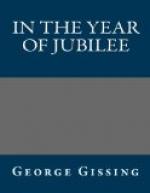’She may not get home until seven or half-past; then she will have a meal. I had better put it off till about half-past eight. That leaves me some four hours to dispose of. First of all I’ll walk home, and—yes, by all the devils! I’ll finish that bit of writing. A year ago I could no more have done it, under such circumstances, than have built a suspension bridge. To-day I will— just to show that I’ve some grit in me.’
Down Park Lane, and by Buckingham Palace across to Westminster, he kept his thoughts for the most part on that bit of writing. Only thus could he save himself from an access of fury which would only have injured him—the ire of shame in which a man is tempted to beat his head against stone walls. He composed aloud, balancing many a pretty antithesis, and polishing more than one lively paradox.
In his bedroom-study the fire had gone out. No matter; he would write in the cold. It was mere amanuensis work, penning at the dictation of his sarcastic demon. Was he a sybarite? Many a poor scribbler has earned bed and breakfast with numb fingers. The fire in his body would serve him for an hour or two.
So he sat down, and achieved his task to the last syllable. He read it through, corrected it, made it up for post, and rose with the plaudits of conscience. ’Who shall say now that I am a fop and a weakling?’
Half-past seven. Good; just time enough to appease his hunger and reach Grove Lane by the suitable hour. He went out to the little coffee-shop which was his resort in Spartan moods, ate with considerable appetite, and walked over Westminster Bridge to the Camberwell tram. To kill time on the journey he bought a halfpenny paper.
As he ascended Grove Lane his heart throbbed more than the exercise warranted. At the door of the house, which he had never yet entered, and which he had not looked upon for more than a year, he stood to calm himself, with lips set and cheek pale in the darkness. Then a confident peal at the knocker.
It was Mary who opened. He had never seen her, but knew that this grave, hard-featured person, not totally unlike a born gentlewoman, must be Mary Woodruff. And in her eyes he read a suspicion of his own identity.
‘Is Miss. Lord at home?’ he asked, in a matter-of-fact way.
‘Yes.—What name shall I mention?’
‘Mr. Tarrant.’
Her eyes fell, and she requested him to enter, to wait in the hall for a moment; then went upstairs. She was absent for a few minutes, and on returning asked him to follow her. She led to the dawing-room: on the way, Tarrant felt a surprise that in so small a house the drawing-room should be correctly situated on the upper floor.
Here he had again to wait. A comfortable room, he thought, and with a true air of home about it. He knew how significant is this impression first received on entering a strange abode; home or encampment, attraction or repulsion, according to the mind of the woman who rules there. Was it Nancy, or Mary, who made the atmosphere of the house?




